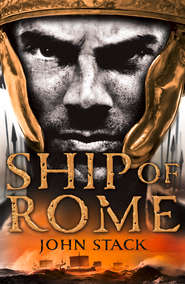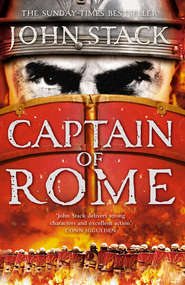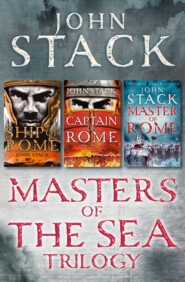По всем вопросам обращайтесь на: info@litportal.ru
(©) 2003-2024.
✖
Armada
Автор
Год написания книги
2018
Настройки чтения
Размер шрифта
Высота строк
Поля
The wind ebbed for a moment and de Acuña’s nose wrinkled at the stench from the galley slaves. There were 144 of them chained to their oars on the open main deck. De Acuña looked upon them with disgust. They sat languidly at their oars, their heads bowed in silence with only the occasional rasping cough emanating from their ranks. They were condemned men, sentenced to serve at the oars of the Asuncion at the King’s pleasure and de Acuña thought again of how welcome the governor’s house would be after the confines of the galley.
The day on board his command ship had been like any other over the previous month; long and tedious, but thankfully it was coming to an end. The sun was already dropping at pace towards the western horizon behind El Puerto de Santa Maria on the far side of the harbour mouth. He looked to the supply fleet anchored a mile further up the harbour, their individual hulls and masts indistinguishable save for the 1,000 ton Genoese merchantman and one of a pair of galleons he knew to be amongst them, its high castles silhouetted against the evening sky.
De Acuña’s gaze remained fixed on the distant galleon, a magnificent evolving breed of ship so different to the aged galleys of his command. At Lepanto the galley had reigned supreme but now they were rapidly becoming obsolete in an age where warships were not only measured by the number of men and cannon they could carry, but also how far they could project that power. The sturdy ocean-going galleons had pushed the borders of the Spanish Empire to the four corners of the globe but its success had left ships such as the Asuncion languishing in home waters, relegated to guarding merchants and victuallers, a loathsome task for the once noble galley and its comandante.
‘Ships approaching bearing north-west,’ a lookout called and de Acuña spun around to look beyond the harbour mouth and the tip of the headland of Cadiz. A fleet of sail were strung out across the sea lane to the harbour, their number difficult to gauge. De Acuña smiled. Juan Martínez de Recalde’s squadron, he thought to himself. Their arrival from the Bay of Biscay was long overdue. He called the galley’s captain to his side.
‘Signal the El Gato. Tell them to come alongside,’ he ordered and the captain called to the patache, a small sailing ship attending the galleys.
The El Gato tacked swiftly into position and de Acuña transhipped onto the nimble craft, ignoring the salute of its captain as he ordered him to make haste to the edge of the harbour mouth. De Acuña wanted to welcome the commander of the Biscayan squadron personally, knowing how influential and powerful de Recalde was. As the El Gato swung away, de Acuña made his way to the foredeck, his eyes searching for de Recalde’s flagship, the Santa Ana, a magnificent 760 ton galleon that had been launched only the year before.
The oncoming ships bore on, now less than a mile away, and de Acuña’s eyes narrowed as he noticed for the first time that none of them had their masthead banners unfurled. He scanned the broad front of the squadron, searching again for the flagship, but the galleon in the van looked unlike any he had seen before. He felt a slight chill of unease but quickly dismissed it, angry at his sudden nervousness. The Santa Ana could be sailing at the rear of the squadron, or might even have disengaged at Lisbon.
De Acuña kept his attention on the lead galley. Its decks were frantic with activity and its sails remained unfurled although the harbour mouth was almost upon them. The gap fell to four hundred yards and de Acuña could now make out individual figures on the fo’c’sle. His eyes narrowed against the wind as he tried to focus, unease creeping up his spine once more. They were spaced out along the gunwale and seemed to be…muskets! They were carrying muskets!
‘Bear away!’ de Acuña shouted and he gazed in horror as an eruption of smoke burst forth from the bow chasers of the galleon, followed a heartbeat later by the boom of cannon.
The sea in front of the El Gato exploded and water flew up in a torrential spray. The salvo fell mercifully short and the patache heeled over into the turn, its nimble hull, under a full press of canvas, sailing swiftly out of the path of the incoming ships. De Acuña counted the number of enemy ships, his anger at the deviousness of the surprise attack overriding his alarm that such a powerful fleet was arrayed against him. For a moment he wondered who they could be, but he realized quickly there was no other foe who would dare to attack one of the greatest ports in Spain. The galleons were English!
He looked to his galleys. They had already slipped their anchors and the finely balanced vessels were quickly coming up to their attack speed. He called to the captain to steer an intercept course to the Asuncion, eager to take command of the flotilla, knowing that every passing minute was one lost to the enemy, and he swiftly made the aft deck of his galley.
‘Signal the squadron to form rank and present their bows to the enemy. We must try to hold the line here at the harbour mouth.’
The crew of the Asuncion responded with alacrity while all around the other galleys separated to gain sea room, turning to bring their two fore mounted, preloaded, medio cañónes to bear.
De Acuña watched his squadron manoeuvre with pride, their movements precise and controlled although they were facing an enemy many times their superior in both number and firepower. The archaic strength of a galley to ram and board could only be used against becalmed galleons, not those with the wind to command. His squadron were following his orders without question, but de Acuña realized that before his ships had fired even a single shot, they were doomed to fight a losing battle.
Evardo heard the cannon’s report a mile away. Its sound was muted by distance and he looked to the mouth of the harbour. A fleet of sailing ships was on the cusp of entering. The welcoming salvo marked them as de Recalde’s squadron but Evardo noticed with curiosity that they were sailing under a full press of canvas, a seemingly unwise approach at speed into the confines of the harbour mouth.
‘Why such haste?’ Abrahan asked, echoing Evardo’s thoughts.
‘Perhaps he is carrying orders of some import,’ he suggested, seeing in Abrahan’s expression the same doubt he felt himself. He looked back to the harbour mouth, his gaze sweeping its breadth.
‘De Acuña’s galleys,’ he breathed, noticing their changing aspect, ‘they’re sallying out to intercept the fleet.’
Evardo hesitated for a moment longer.
‘Clear for action,’ he roared, walking swiftly to the centre of the quarterdeck. ‘Raise the anchor. Hoist top gallants and mizzen.’
The crew of the Halcón sprung into action. The men spilled out from below decks to take to the shrouds while below the capstan of the anchor rope began to turn under the strident commands of a deck officer.
Evardo looked to Abrahan and the older man nodded in tacit agreement of the call to arms. Suddenly the air was rent with the distant sound of cannon fire, its intensity ending all doubt. Many of the crew of the Halcón froze and looked to the harbour mouth.
‘As you were!’ Evardo roared, the crew reacting to the whip crack of his command. He looked aloft. ‘Masthead, report!’
‘At least a dozen warships, galleons,’ the lookout called, ‘with smaller sail to the rear.’
‘What flag?’ Evardo shouted.
‘I see none, Comandante.’
‘And de Acuña’s galleys?’
‘They are fanning out in front of the attackers to close the harbour mouth.’
Evardo looked to the distant fight. ‘Que coraje,’ he whispered, his chest filling with pride for de Acuña’s forlorn daring.
The Halcón pressed forward slightly as the first sails took the light wind, the galleon coming up short against the anchor rope until the flukes gave way. The crew hauled in the remaining line.
‘Shall I call for topsails and courses, Comandante?’ the ship’s captain asked as Evardo looked to the waters surrounding the Halcón. The supply ships on all sides were already slipping their anchor cables in panic, raising their sails oblivious to the proximity of the other boats around them.
‘Hoist no more sail until we clear these other boats,’ Evardo replied, cursing his lack of foresight in not placing the Halcón in more open water.
The galleon came up to steerage speed and Evardo watched the sea ahead as the captain called out his orders to the helmsman, the two men working together to try to thread the Halcón through the heaving labyrinth of ship infested waters. A sudden crash caused Evardo to spin around and he stared in anger at a collision between two merchantmen. The crews were calling across at each other in futile rage, while underneath, Evardo could feel the panic beginning to envelop the hapless supply fleet. He looked ahead once more at the ships cutting loose across the path of the Halcón, realizing with dread that they were all but trapped.
‘Bring the larboard broadside to bear, Mister Varian.’
‘Hard to larboard,’ Robert shouted to the captain’s command and the Retribution turned tightly to starboard, presenting its port broadside to the Spanish galleys. On the gun deck beneath the main, Larkin, the master-gunner, waited patiently for the galleon to settle on its new course. He called out for the gun crews to stand ready. They stood with their linstocks poised. A bead of smoke trailed from each slow match.
Larkin, a bull of a man with hands blackened from his trade, had trained the crews relentlessly. On the gun deck he was in direct command of the most powerful weapons on the Retribution, two demi-culverins, eight culverins, and two cannon-pedros chasers both fore and aft that could hurl a 24 pound iron shot. On the main deck above he was ably seconded by the gunner’s mate, Peters, who had under his charge a further two demi-culverins, eight lighter sakers and eight man-killing falcons.
The Retribution completed the turn and Larkin stared out the foremost gun port to the squadron of Spanish galleys. Their bow mounted guns were firing intermittently, creating a cloud of smoke which compromised Larkin’s aim but with an experienced eye he pictured the outlines of his prey beyond the shroud. The outer galleys of the squadron passed before him and still he waited. The galleys surrounding the lead ship were more tightly packed.
‘Steady, boys,’ he shouted.
The Retribution swooped into the trough of a wave, its cutwater slicing up a spray of water. Larkin felt the recovery of the hull in the pit of his stomach, the beginning of the upswing as the galleon began its climb up the next swell. He took a half-breath.
‘Fire!’
As one, the linstocks fell on the touchholes of the guns. Larkin’s command was followed a heartbeat later by Peters’s on the main and the galleon bucked with the force of the double cannonade. The upper decks were engulfed in a blanket of gunpowder smoke and the deafening thunder of the broadside temporarily stunned the gun crews. The Retribution reeled but, like a prize fighter recovering from a blow that had winded but not wounded, the galleon quickly steadied.
Larkin was at once roaring at his crews, his throat and eyes burning from the foul smoke that filled the cramped gun deck. The men strained at the ropes to run in the four-wheeled carriages of their weapons and the pulleys squealed in protest as the guns, some of them weighing over 3,000 pounds, rolled across the deck. The crews’ discipline made them oblivious to the results of the first wave of fire they had unleashed upon an enemy. Every action counted down the time it would take them to ready their guns to fire again.
Cannon balls tore across the three hundred yards of open water towards the Asuncion and the galleys flanking her, striking even as the Spanish crews registered the eruption of smoke from the English galleon. De Acuña straightened his back and tightened his grip on the hilt of his sword, his every instinct screaming at him to take cover, while his rank and honour commanded him to stand tall on the fore deck.
A brace of cannon balls whistled over his head, striking the rigging of the Asuncion. Another slammed into the mainmast and the timber disintegrated in a rain of splinters that tore through the ranks of rowers on the open decks, the arrow-like fragments piercing flesh and spirit, spreading blood and panic amongst the defenceless slaves. The heavier cannon-pedro balls struck the hull and oars. The iron shot did not pierce the oak timbers of the bow but the fifteen foot long oars were snapped clean and the recoil of the blow broke the hands and wrists of the slaves still holding their charge.
The Asuncion was a maelstrom of noise. The screams of the injured fuelled the chaos of the panicking slaves and they tore the flesh of their ankles as they fought against the shackles holding them fast. De Acuña closed his mind to the noise and fixed his attention on the formation of enemy galleons, watching as the next ship sailed into position to deliver a broadside. Around him the crew worked frantically to reload the medio cañónes, their single preloaded 20 pound shot long since expended.
After the opening salvo the leading English galleons had formed into a ragged line and had in turn presented their guns to his squadron of galleys with devastating results. The next galleon swinging into position would be the sixth to make its attack run and de Acuña looked to the galleys on his flanks, his nerve faltering at the sight. The scuppers of each ship ran red, as if the galleys themselves were bleeding from the terrible wounds the enemy cannon balls had inflicted. More than one had been dismasted while the closest galley to the Asuncion was listing badly, its crew working desperately to pump out the ceaseless tide of seawater.
De Acuña had known from the start the odds were impossibly stacked against him but he had nevertheless stood firm where others might have fled. Now that resolve was failing. The relentless cannonades of the enemy ships had pierced his courage, forcing him to accept his position was beyond hopeless and bordering on madness. He called the galley captain to his side.
‘Take the rowers in hand and signal the other galleys. We sail for El Puerto de Santa Maria.’
The captain nodded and was away. De Acuña turned back to the enemy formation, his gaze falling on the galleon reaching the zenith of its attack run. Its cannons were run out and the baleful black eyes of the muzzles tracked the galleys of his command before disappearing behind an explosion of gun smoke. The boom of cannon was followed by the dreadful whine of round shot tearing through the air. De Acuña’s squadron reeled once more under the hammer blow, unable to respond in kind, and as they turned towards the shelter of El Puerto de Santa Maria, de Acuña could only hope his stand had given the supply fleet time to disperse into the shallows of the upper harbour.
‘Hard to starboard! Make way!’ Evardo roared with impotent fury, but it was too late and he was thrown to the deck as the Halcón collided with the trading carrack that had cut under the bow of the galleon. The momentum of the larger warship bore her on, locking the two vessels together in a tighter embrace. The bowsprit of the Halcón snapped off in the rigging of the carrack and the galleon pitched violently as its hull ground along the starboard bow of the smaller ship before coming to rest in a tangle of shattered spars.









